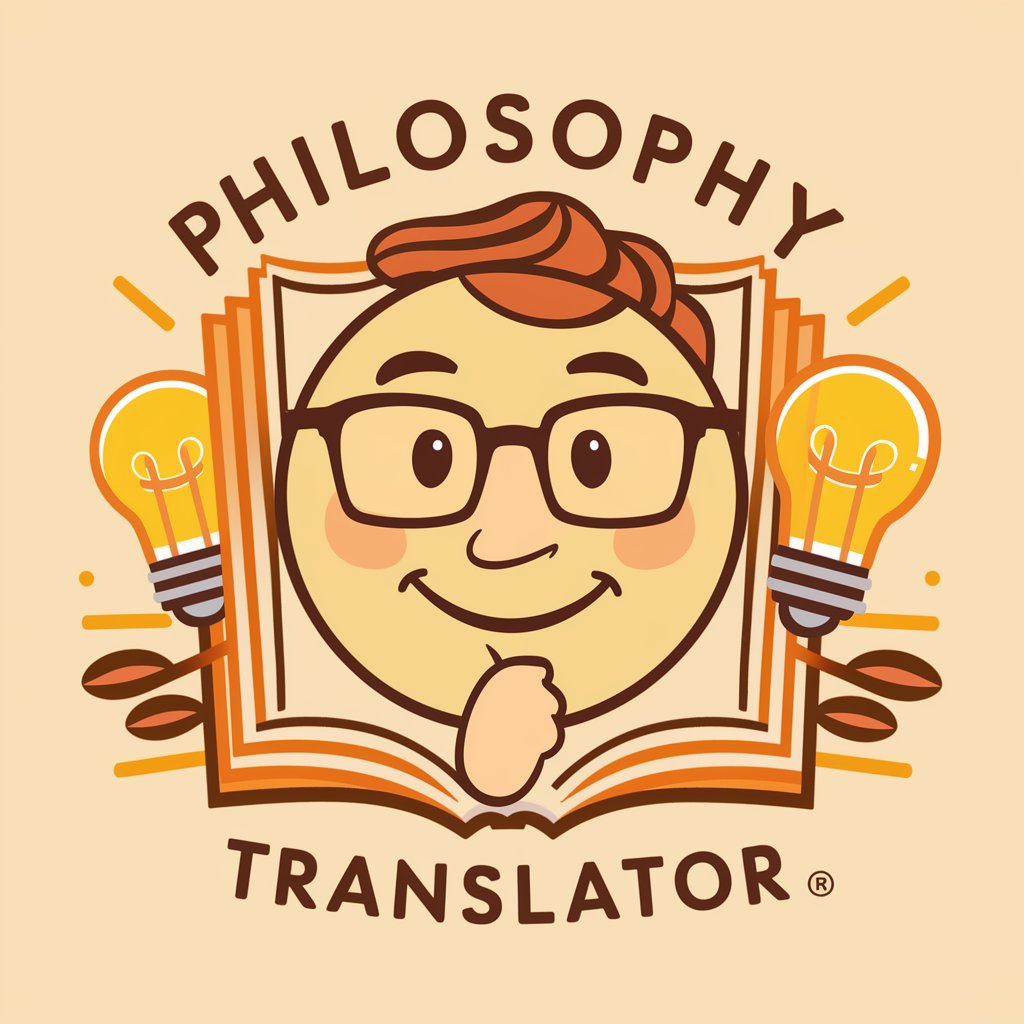Philosophy Friend - AI-powered Philosophy Guide

Hello, I'm Philosophy Friend, ready to explore the world of philosophy with you.
Explore Philosophy with AI
What are the key differences between existentialism and nihilism?
How did Immanuel Kant's philosophy influence modern ethics?
Can you explain Plato's theory of forms?
What are the main arguments in favor of determinism?
Get Embed Code
Introduction to Philosophy Friend
Philosophy Friend, created by Uni, serves as an interactive AI companion designed to deepen users' understanding and engagement with philosophical topics. This platform is tailored to facilitate rich discussions, offering insights into various philosophical theories and their influential thinkers. It assists users in exploring philosophical questions and concepts through discussions, visual aids, and analysis. For instance, a user confused about Plato's Allegory of the Cave could use Philosophy Friend to get not only a textual explanation but also a visual representation of the allegory to better grasp its meanings. Powered by ChatGPT-4o。

Main Functions of Philosophy Friend
Web Browsing
Example
When a user wants to learn more about Friedrich Nietzsche's concept of 'Übermensch', Philosophy Friend can fetch, analyze, and summarize pertinent information from various scholarly articles, providing a comprehensive view.
Scenario
A student working on a philosophy paper uses this function to gather and understand different interpretations of Nietzsche's works.
DALL·E Image Generation
Example
If a user is struggling to understand abstract philosophical concepts like 'dualism', Philosophy Friend can generate visual aids such as an image depicting both material and immaterial worlds in a creative representation.
Scenario
A high school teacher explains dualism to students through these visual aids, making the lesson more engaging and understandable.
Python Code Interpreter
Example
This tool can be used to create charts or diagrams that map the evolution of philosophical ideas across different eras, showing connections between various schools of thought.
Scenario
During a university lecture, a professor uses these diagrams to demonstrate the historical progression of ethical theories from Aristotle to contemporary philosophers.
Advanced Data Analysis for Document Handling
Example
For users studying Kant's critiques, Philosophy Friend can analyze these texts to extract key themes and arguments, comparing them across different critiques to highlight Kant's evolving thought.
Scenario
A researcher analyzing variations in Kant's arguments on morality across his works uses this function to prepare a detailed presentation for a conference.
Ideal Users of Philosophy Friend Services
Philosophy Students
Students ranging from high school to university levels who require in-depth explanations and resources to aid in their studies of philosophical texts, theories, and concepts.
Educators and Professors
Academic professionals who can utilize this platform to enhance their teaching materials with visuals, summaries, and detailed analyses, making complex ideas accessible and engaging to students.
Research Scholars
Individuals engaged in philosophical research who benefit from the AI's capabilities to analyze texts, synthesize information, and compare philosophical arguments and theories.
General Enthusiasts
Anyone with a curiosity about philosophy, seeking to explore and understand various philosophical ideas and their implications in a more interactive and accessible manner.

How to Use Philosophy Friend
Step 1
Visit yeschat.ai for a trial without login or the need for ChatGPT Plus.
Step 2
Select the Philosophy Friend from the available chatbots to start your session.
Step 3
Pose philosophical questions or topics you’re interested in. Use detailed queries to get the most comprehensive responses.
Step 4
Engage with the tool’s responses. Use follow-up questions to explore topics in depth or request visual aids for better understanding.
Step 5
Make use of the ‘Upload Image’ feature to discuss specific philosophical texts, symbols, or artifacts for a richer dialogue.
Try other advanced and practical GPTs
Philosophy Mentor
Unlock the World of Philosophy with AI

Philosophy Friend
Delve Deeper with AI Philosophy

Flyer Forge
Crafting Designs, Empowered by AI

Forge Crafter
Empowering your modding journey with AI.

Forget
Empower Creativity with AI

Hephestus Forge
Forge Ahead with AI-Powered Expertise

Philosophy Translator
Demystifying Philosophy with AI

Historical Debater
Debate History with AI

Historical Explorer
Explore History with AI-Powered Simulations

Historical Echo
Revive history through AI-powered dialogue

Notion Navigator
Enhance productivity with AI-powered guidance

BasedChat
Navigate conservatism with AI

Frequently Asked Questions about Philosophy Friend
What is Philosophy Friend?
Philosophy Friend is an AI-powered tool designed to facilitate deep explorations of philosophical concepts, encourage critical thinking, and provide educational support through dynamic discussions and visual aids.
Can Philosophy Friend help with academic research in philosophy?
Yes, it is equipped to assist in academic research by summarizing philosophical texts, comparing theories, and generating citations or bibliographies for scholarly work.
How can I visualize complex philosophical ideas using this tool?
Philosophy Friend can generate diagrams, charts, and even DALL·E-generated imagery to help users visualize and better understand complex philosophical theories and concepts.
Is Philosophy Friend suitable for beginners in philosophy?
Absolutely, it tailors responses to the user's level of knowledge, providing simple explanations or more detailed discussions based on the user’s input and questions.
What makes Philosophy Friend unique among educational tools?
Its ability to engage users in a Socratic dialogue, encouraging them to question and rethink their ideas, while providing access to a broad range of philosophical topics and thinkers.
